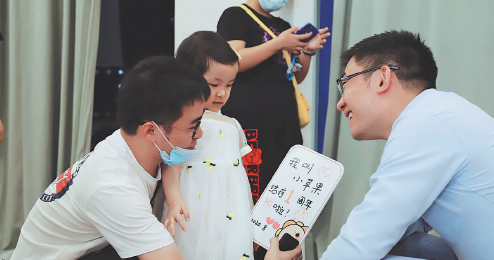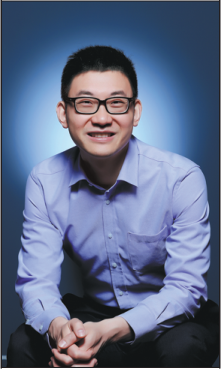The myth-buster

Li Zhizhong is on a mission to provide accurate information about cancer, Wang Qian reports.
Every minute last year, on average, nine people in China were diagnosed with cancer, while six others died from it, according to the latest data from the International Agency for Research on Cancer of the World Health Organization, which was released in December.
It is estimated that by the age of 75, one in four people in China will develop cancer in one form or another, which means that it can affect anyone. But for Li Zhizhong, while such figures may paint a bleak picture, a cancer diagnosis doesn't necessarily mean a death sentence.
"The main reasons for the growing number of cancer patients is our increasing life span and detection ability," explains Li, a science writer attempting to help demystify the topic of cancer online, adding that, with an increasing number of people diagnosed, it is time to ensure the public are better informed about the disease.
Since 2013, under the pen name Pineapple, the 37-year-old has posted reliable and reader-friendly articles about cancer on the internet.
His 2018 speech-Truth About Cancer-on Yixi, a speech-sharing platform similar to TedTalk, has been viewed more than 100 million times. In the speech, Li debunked many myths and misconceptions related to cancer that have been widely circulated online. He spoke about Wei Zexi, a 21-year-old student from Xidian University in Shaanxi province, who died from a rare cancer of the soft tissue in 2016.
"The tragedy shocked me most, because one and a half years before his death, I had written an article about the ineffectiveness of immunotherapy treatment," Li said during his speech, adding that it was his deep regret that the article hadn't reached more people like Wei.
"I keep writing these articles, because I hope that, if they can be read by more people, maybe some lives, or even families, can be saved," Li says.
His official WeChat account has a section in which he dispels cancer myths, such as sweet potatoes being an anti-cancer food, that cancer is transmissible from someone who has it, suggestions that baijiu kills cancer cells, the assertion that red meat causes cancer, the theory that cellphone use increases the risk of getting cancer and the idea that cancer can be starved to death.
"With the development of new treatment methods and advances in detection over the past two or three decades, many cancer types can be managed as chronic illnesses," Li says.
In China, lung cancer is the most commonly occurring variant, followed by colorectal cancer, stomach cancer, breast cancer and liver cancer, according to IARC. Lung cancer was the leading cause of cancer death nationwide, claiming about 710,000 lives last year, according to the organization.
Starting point
Li still remembers how shocked and upset he was when his mother was diagnosed with breast cancer in 2005. Even though he was then a senior major in biology at Tsinghua University, he had no clue about the disease or understanding of the data and medical terms in his mother's test report.
It was the first time that Li recognized the dearth of credible information about cancer and its treatment online, and how many myths about the disease there were to mislead patients when making critical treatment decisions.
"My mother's cancer diagnosis has changed the course of my life. My family has encountered various challenges in her treatment and care, which makes me want to help more people learn about the disease in a scientific way," Li says. After breast-removal surgery, his mother underwent a course of chemotherapy.
"Her experience made me decide to study in the United States for its advanced biomedical research," Li remembers.
After graduating from Duke University with a PhD in molecular cancer biology in 2009, he worked in the US for Swiss pharmaceutical company Novartis Institutes for BioMedical Research as a research investigator in the department of Oncology Drug Discovery, focusing on new target identification and validation until 2018.
In August 2013, he wrote his first article about the differences between cancer and tumors. In the article, he explains that a tumor is a condition where there is abnormal cellular growth thus forming a lesion or a lump in some part of the body, while cancer is a degenerative condition where there is uncontrollable cellular growth that spreads in the body. The article was keen to note that not all tumors are cancerous.
He has since posted hundreds of articles on his official WeChat. Some articles have taken him about 10 hours to check material and data, translate English terms into Chinese, and consult other doctors or experts for accurate information.
"When writing the articles, it is like answering the questions and doubts that I had 16 years ago," Li says.
He has published four books about cancer in a bid to help patients, families and healthcare providers to have a better understanding of the disease.
In his preface for Li's book, Cancer Insights, Zeng Yixin, deputy head of the National Health Commission, says that, on one hand, it is not easy to introduce cancer to the public for its complicacy; on the other, cancer research and development has been very quick, with new studies appearing every day.
"I hope that my books will not only provide information and data that readers need, but also provide them with a hopeful outlook for the future," Li says.
Charity foundation
In 2018, he quit his job in the US and founded the Shiyu Children Foundation in Shenzhen, Guangdong province. It aims to promote awareness, patient education and drug discovery for pediatric cancers, of which 40,000 new cases are diagnosed every year in China.
"Childhood cancers are rare, making up about 1 percent of all cancers. As a result, these groups have been neglected in detection and treatment," Li says, adding that everyone with cancer should be concerned.
According to IARC, cancer in children is very different from cancer in adults, involving different cancer types and occurring much less frequently. Today, in high-income countries, 80 percent of childhood cancer patients have a good chance of survival, compared with only 20 percent 50 years ago.
Globally in the last 30 years, only four new drugs have been approved that were specifically developed to treat children with cancer.
"There is not much economic benefit in the research of childhood cancers. That's why our organization is needed to make a difference," Li says.
Last year, the foundation cooperated with search engine Baidu to provide scientific information on 25 entries related to pediatric cancers, which have been edited and checked by 19 clinical specialists in children's oncology from the country's top hospitals. The information covers details on the causes, symptoms, treatments, prognosis to these cancer types. As of December, the information has been accessed more than 30 million times.
"Within two years, the organization has helped parents and children with cancer to get access to scientific information, online and offline," Li says.
He adds that besides educational program, he hopes that one day the foundation can cooperate with top experts, pharmacies and academies in the research of pediatric cancer drugs, bringing hope to all children with cancer around the world.
"Every child deserves a bright and healthy future," Li says, smiling.
Contact the writer at wangqian@chinadaily.com.cn























